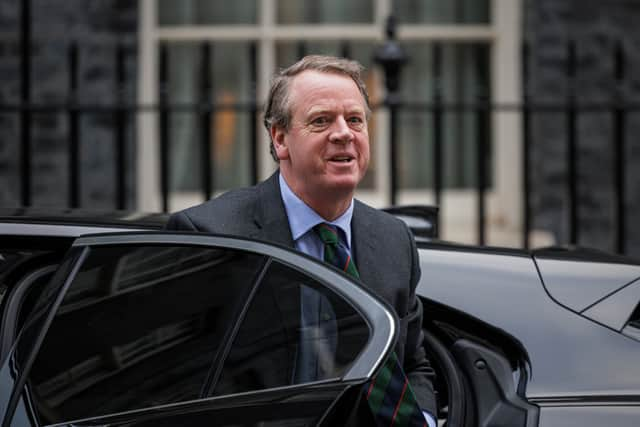Scotland gender reform: UK government to use section 35 to block legislation - what did Alister Jack say?
and live on Freeview channel 276
Scottish secretary Alister Jack has defended his government’s decision to block the controversial Gender Recognition Reform bill in Scotland - but stated that the move will not set a precedent going forward. Supporters of the bill, which passed in Holyrood last month with cross-party agreement, have accused the UK government of overstepping in their use of the Section 35 order to veto the bill becoming law, with some voicing concerns over Westminster’s willingness to step in and block devolved laws.
Jack said that the move does not mean that the UK government are seeking to veto legislation in Scotland “whenever it chooses”. In a statement to the House of Commons, he said that the decision to trigger the Section 35 order for the very first time came after the government received legal advice that it bill would have “serious adverse effects” on UK-wide qualities legislation.
Advertisement
Hide AdAdvertisement
Hide AdThe decision has been heavily criticised by the SNP and other parties within Scotland, with many arguing that the constitutional first is undemocratic. First minster Nicola Sturgeon told BBC News that the decision will “inveitably end up in court”, while Scotland’s social justice secretary Shona Robison decribed the Westminster as “increasingly draconian”.
However, Jack hit back at critics by stressing that Section 35 had been included in the Scotland Act 1998, the legislation which established the Scottish Parliament. He also told opponents that members of the SNP were among those who voted to accept the addition of the power in the act.
The SNP has said that it will look into launching a judicial review into the decision to block the legislation. This deadline for this review to be logged will be bofore Sturgeon steps back as party leader, meaning that this could be the final big act of her premiership.
What did Westminster say about blocking the Gender Recognition Reform bill?
Following the announcement of the blocking, Jack said in a statement: “Transgender people who are going through the process to change their legal sex deserve our respect, support and understanding. My decision today is about the legislation’s consequences for the operation of GB-wide equalities protections and other reserved matters.
Advertisement
Hide AdAdvertisement
Hide Ad“I have not taken this decision lightly. The Bill would have a significant impact on, amongst other things, GB-wide equalities matters in Scotland, England and Wales. I have concluded, therefore, that this is the necessary and correct course of action.”
Prime minister Rishi Sunak has previously said that he has concern over the new law and how it would impact UK-wide equalities law. Labour leader Sir Keir Starmer has also voiced his trepidation in aspects of the bill, including the lowering of the age of consent for changing gender.
On Tuesday 17 January, Jack addressed the House of Commons to explain his government’s constitutional position in using Section 35 for the first time. He said: “This is the first time the power has been exercised and I acknowledge that this is a significant decision.
“The powers of Section 35 of the Scotland Act are not new and this Government has not created them. They have existed as long as devolution itself.


Advertisement
Hide AdAdvertisement
Hide Ad“The Section 35 power provides a sensible measure to ensure that devolved legislation does not have adverse impacts on reserved matters, including the equalities legislation. This is not about preventing the Scottish Parliament from legislating on devolved matters, but about ensuring we do not have legal frameworks in one part of the United Kingdom which have adverse effects on reserved matters.
“We should be clear that this is absolutely not about the United Kingdom Government being able to veto Scottish Parliament legislation whenever it chooses, as some have implied. The power can only be exercised on specific grounds and the fact that this is the first time it has been necessary to exercise the power in almost 25 years of devolution emphasises that it is not a power to be used lightly.”
What has been the reaction to Westminster blocking gender reforms in Scotland?
Sturgeon had previously described the possible move as an “outrage”. In response to the confirmation that Westminster will seek to block the bill, the Scottish first minister said: “This is a full-frontal attack on our democratically elected Scottish Parliament and it’s ability to make it’s own decisions on devolved matters. The Scottish government will defend the legislation & stand up for Scotland’s Parliament. If this Westminster veto succeeds, it will be first of many.”
The Scottish Greens’ equalities spokesperson, Maggie Chapman MSP said: “This is a dark day for our devolution settlement, for democracy, and for trans rights. It sets a very alarming new precedent that should concern everyone who believes in devolution and wants the Scottish Parliament to exist.
Advertisement
Hide AdAdvertisement
Hide Ad“Only one month ago, MSPs voted overwhelmingly for Gender Recognition Reform. It was a proud day for equality, and for our Parliament. To see a reactionary Tory government trying to block or overturn it is nothing short of outrageous, and we will resist them every step of the way.”
Former Scottish Labour leader Richard Leonard also criticised the move. In a tweet, he said: “Disgraceful decision that should be opposed by everyone who believes in democracy, devolution, equality and LGBT+ rights. Solidarity with trans people.”
The move has been described as a “nuclear option” by transgender rights charity Stonewall. Chief executive of the charity Nancy Kelley said: “It is the only time that Section 35 of the Scotland Act has been used since 1998, in an unprecedented move which significantly undermines the devolution settlement and will unlock constitutional and diplomatic strife.”
Comment Guidelines
National World encourages reader discussion on our stories. User feedback, insights and back-and-forth exchanges add a rich layer of context to reporting. Please review our Community Guidelines before commenting.
